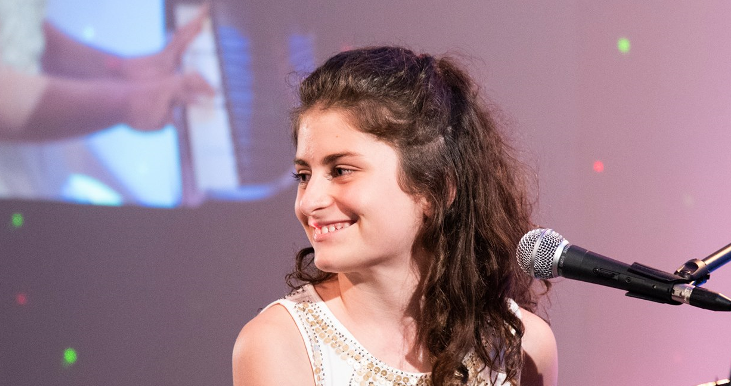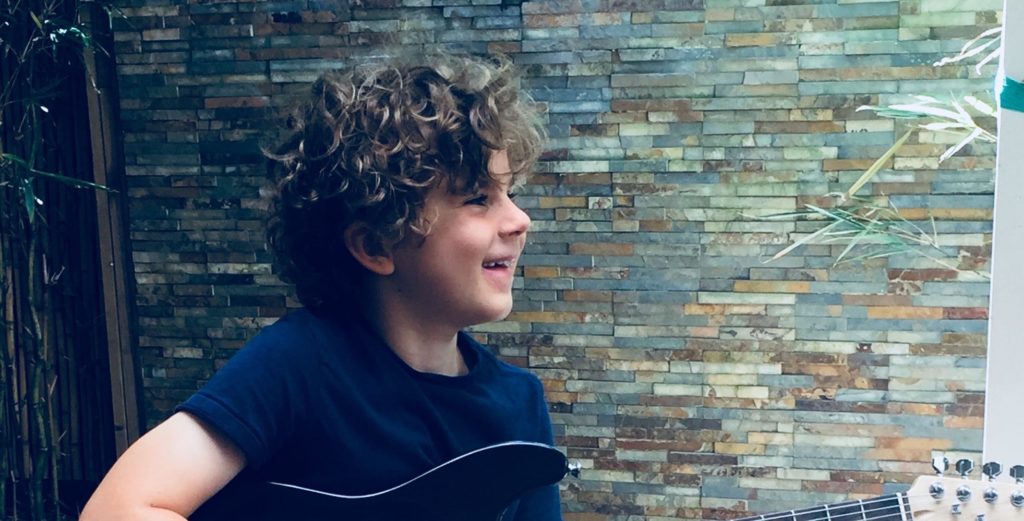It takes a gutsy teenager to write to the Queen of the United Kingdom, reach out to the creators of hit TV comedy The Simpsons and compose a musical about hearing-impaired kids called Listen Up, ready to stage as a performance.
At the tender age of 14, Isabel is so enthusiastic about her future, she has crafted a CV and, while still in Grade 8 of high school, has recently applied for a job as a TV scriptwriter.
Since receiving her implant and Cochlear™ Nucleus® 6 Sound Processor at age 10, Isy has developed confidence and found a way to express herself through music and the stage, says her mother. ‘Creatively, she has come to life.’
‘I saw so much change – changes in her personality and confidence. Before her implant, she would tend to get tired socially and withdraw into her own world.’
The teenager has taken up the piano, now composes music, writes plays, and sings in the school choir and rock band. She was recently named Voice of The Future by The Shepherd Centre, an Australian organisation that supports children with hearing loss.
But despite Isy’s creative talents and vibrant exterior, high school has been a challenge.
‘Life is not always easy at school. Being ostracised is an everyday thing – some days it’s hard to muster the courage to go to school.’
Isy’s mother says that, while schools might have strategies to combat bullying, it’s often the less obvious behaviours that can be hurtful and hard for a teen to deal with: rolling of eyes, hand signals, physical exclusion, sitting alone in class or being the last one to be selected for a team sports activity.
‘Children with hearing loss are coming from a difficult place because they can be excluded and it doesn’t help if your child is not sporty,’ she says.
So how do you support a child who is experiencing the emotional torment of bullying or feeling excluded by others at school?
Tips that help Isy cope with high school challenges:
1. Find out what lights them up
‘If you have a child with challenges, find their signature strength. Be open to discovering, try lots of different activities and find out what lights them up,’ advises Isy’s mother.
For Isy, this has been taking up the piano and, more recently, enrolling in drama classes. ‘She has found a beautiful tribe outside school. Isy has also been lucky to find inspiring art and English teachers who have ignited a spark for Isy. She’s loving drawing, cartooning and animation.’
2. Arm them with a toolkit for school
Children are curious and ask questions about hearing loss and hearing devices. Talk about questions that people might ask and help your child to have responses ready.
‘We would advise her to answer their questions and be open. It’s often not as bad as you think when you have some answers prepared. Kids have asked Isy questions like: “What’s that brown thing on your head? What’s the flashing light on your ear for?” So many kids these days are wearing tech devices anyway.’
3. Deal with the Sunday night dread
Give children a mental break when they are at home from school and surround them with support. Focus on making home a place of laughter, happiness and positivity.
Try activities to distract teens from the ‘Sunday night dread’ ahead of school on a Monday.
‘We go for a long walk with the dog and Isy tells us her new story ideas. Sometimes her dad takes her for a late swim at the beach. Or we play music and cook together. Or have a movie night,’ says Isy’s mother.
4. Find a coach for extra-curricular activities
In activities where your child lacks confidence, find someone outside the family to support them. To help Isy with co-ordination and fitness, her parents found a coach to train with her. They say the key is to find someone young and inspiring who gets what it’s like to be growing up.
Now Isy is fitter, stronger and more confident to try. She’s playing soccer and enjoys new sports like American Football.
‘Once she would never have tried this and always shied away from sport. I’ve tried teaching Isy so many sports but sometimes you need to let go and let someone else step in,’ says her mother.
5. Push boundaries to normalise hearing loss
‘We’ve always expected Isy to try everything and not make her hearing loss an excuse. We’re keen bushwalkers and Isy enjoys camping and hiking trips and kayaking with her cousins. She’s enjoyed horse riding and pony camp, a suggestion by her grandparents and close family friends.
‘Isy recently joined us on a family cycling trip in New Zealand – it was a challenging ride for all of us. Isy digs deep and really showed us and herself what she has inside when she’s pushed physically and mentally. Achieving these challenges gives Isy more confidence in her abilities.’
6. Consider a pet
‘We welcomed a dog called Honey into our family at the time of Isy’s surgery. Honey and Isy are inseparable and have an incredible bond,’ says Isy’s mother.
‘When things are changing quickly, her dog is there. When Isy leaves for school her dog stands by her while she gets ready. Honey’s waiting at the door as Isy returns home. Isy confides in her, practises her lines with her, watches TV with her, walks with her – she is truly a best friend!’
7. Involve siblings
Ruby, Isy’s 16-year-old sister, has played a powerful role in helping Isy be aware of social cues, which matter to teenagers.
For example, how girls wear their hair and even the length of the hemline of the school uniform. The little things like this count and help a child to fit in socially.
‘It helps if you can empower the siblings as part of the family support,’ says Isy’s mother.
It’s also helped to have an older sister at the same school and for Isy to be have a safe haven with these older girls in the playground.
‘Life can be tricky for all teenagers and, as parents, we try to help them navigate these years but, ultimately, kids have to do it themselves. ‘We’ve always tried to listen to Isy – to hear her ideas and stories and discuss concerns and ways to stay positive.
‘Encourage them to get up and have a go – nurture the desire to try, and their in-built resilience. Isy now has the ability, focus and self-esteem to take her wherever she wants to go in life.
‘We’re also very lucky Isy has an innate optimism and enthusiasm for life. And often it’s Isy who’s showing us the way!’




